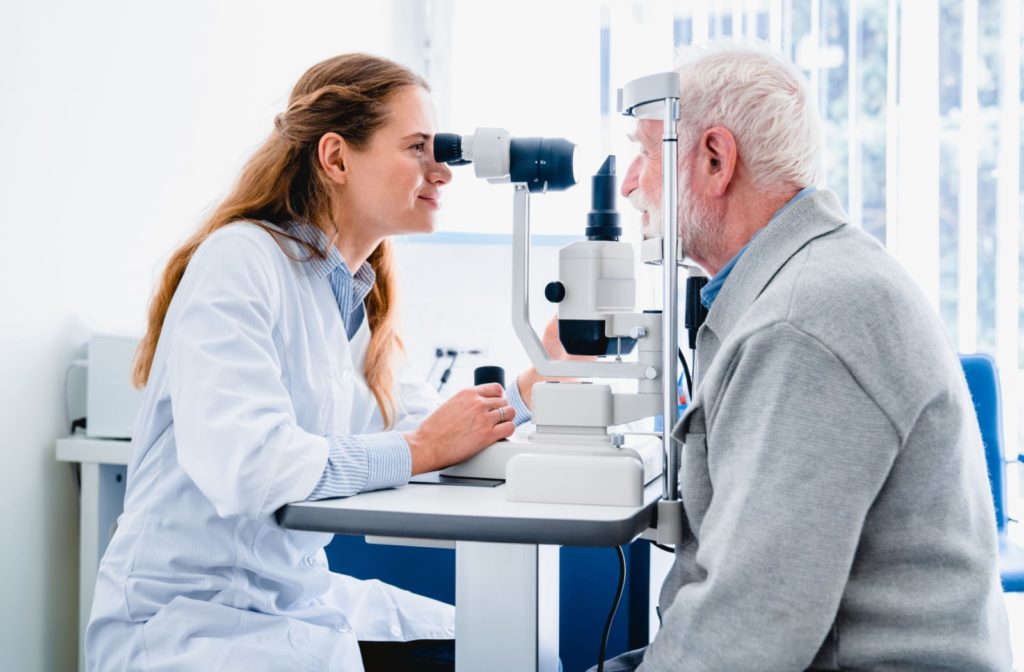Your eyes are amazing. They enable you to see and perceive the world around you and can even provide an inside look at your overall health. Many people may think eye exams are only for eyesight, but an eye exam can also be a crucial part of detecting other diseases early.
In addition to eye diseases, a comprehensive eye exam can also help check for various conditions affecting other parts of your body. Some of the common diseases an eye exam can help detect include sight-threatening eye diseases, diabetes, high blood pressure, autoimmune diseases, and certain cancers.
What Can Be Detected in an Eye Exam?
In addition to the eye conditions that can be diagnosed with eye exams, the tests your optometrist uses to assess your eye health can help identify other issues that could warrant a visit with your general practitioner.
Some of the diseases that a comprehensive eye exam can help detect include the following:
Eye Diseases
A comprehensive eye exam can help identify the early signs of eye conditions before they develop. Some of the most common eye diseases detected in an eye exam include:
- Glaucoma: Many—but not all—variations of glaucoma are caused by an increase in intraocular pressure from excess fluid that can’t properly drain, leading to damage to the optic nerve and potential vision loss.
- Cataracts: Protein clumps in the eyes, or cataracts, can make your vision hazy, like looking out a dirty window. Cataract development is often correlated with age and overexposure to the sun.
- Age-related macular degeneration (AMD): When the macula, the area of your retina facilitating central vision, has a buildup of deposits (drusen), it can damage the macular cells, causing vision loss.
Detecting these conditions early during a routine comprehensive eye exam is critical for preserving vision and maintaining long-term eye health.
Diabetes
Diabetes is a condition that affects millions of people, and it can lead to serious eye problems. The effects of diabetes can cause damage to the blood vessels in your retina, causing a condition called diabetic retinopathy.
Diabetic retinopathy can cause the blood vessels in the retina to leak blood or yellow fluid. During a comprehensive eye exam, your doctor can look for signs of diabetes in your eyes, such as small hemorrhages and swelling.
Early detection is essential for treating diabetic retinopathy and preventing vision loss associated with diabetes, so it’s vital to schedule routine eye exams if you have diabetes or are at risk of developing diabetes.
High Blood Pressure
High blood pressure, or hypertension, is a common condition that can lead to serious health problems such as heart attack and stroke. It can also affect your eyes.
High blood pressure can cause the vessels in your retina to narrow, potentially leading to vision loss. During an eye exam, your doctor can detect narrowing, bends, kinks, or bleeding that may indicate high blood pressure.
Hypertension is a risk factor for sight-threatening eye conditions such as retinopathy and nerve damage in your eyes. Be sure to let your optometrist know if you have high blood pressure, so they can carefully monitor your eyes during your exam.
Multiple Sclerosis
Multiple sclerosis (MS) is an autoimmune disease that affects the nervous system. It can impact your vision in various ways, such as through optic neuritis (inflammation of the optic nerve).
Eye health issues caused by MS can include:
- Double vision
- Eye pain
- Blurry vision
- Unstable eye movement
In some cases, MS can be detected during an eye exam before symptoms occur. If you experience any changes in your vision or eye health, be sure to schedule a comprehensive eye exam.
Thyroid Disease
Your thyroid gland in your neck produces hormones that regulate your metabolism. When your thyroid is overactive or underactive, it can lead to a variety of health problems, including a unique eye condition known as thyroid eye disease (TED).
The symptoms of thyroid eye disease include:
- Protruding eyeballs
- Retracting eyelids
- Double vision
- Dry eyes
- Vision loss
During an eye exam, your doctor can look for signs of thyroid eye disease by looking for bulging of your eyes or abnormal eye movement patterns, which may lead to a diagnosis of Graves’ disease.
Certain Cancers
Some cancers, most commonly melanoma, squamous cell cancer, and basal cell cancer, can affect the eyes, eyelids, and nearby delicate skin. Comprehensive eye exams can uncover signs of skin, blood, and tissue cancers to help you know when to seek further testing.
Brain Tumors
Brain tumors can cause several different symptoms and conditions that affect vision when they put pressure on the back of the eye, including blurry vision, difficulty seeing colors, and vision loss. A comprehensive eye exam can give your doctor a chance to assess these changes in your vision and determine the underlying cause.
Lupus
Lupus is an autoimmune condition that causes inflammation in the body. While lupus often causes dry eyes, it can also affect your sclera and cause changes to the blood vessels in your retina.
Potential lupus symptoms and effects detected during an eye exam can help eye doctors and primary care practitioners determine whether your health is being affected by lupus when they are examined in connection with other symptoms.
Keep an Eye on Your Eyes
Through a comprehensive eye exam, your eyes can provide valuable insight into your overall health. By detecting conditions early, you can take steps to prevent or manage potential health problems and maintain your wellness.
Schedule a comprehensive eye exam with The Eye Care Team to learn more about the unique health of your eyes and body. We have two locations in Eastern Washington to serve you: Spokane and Chewelah.



